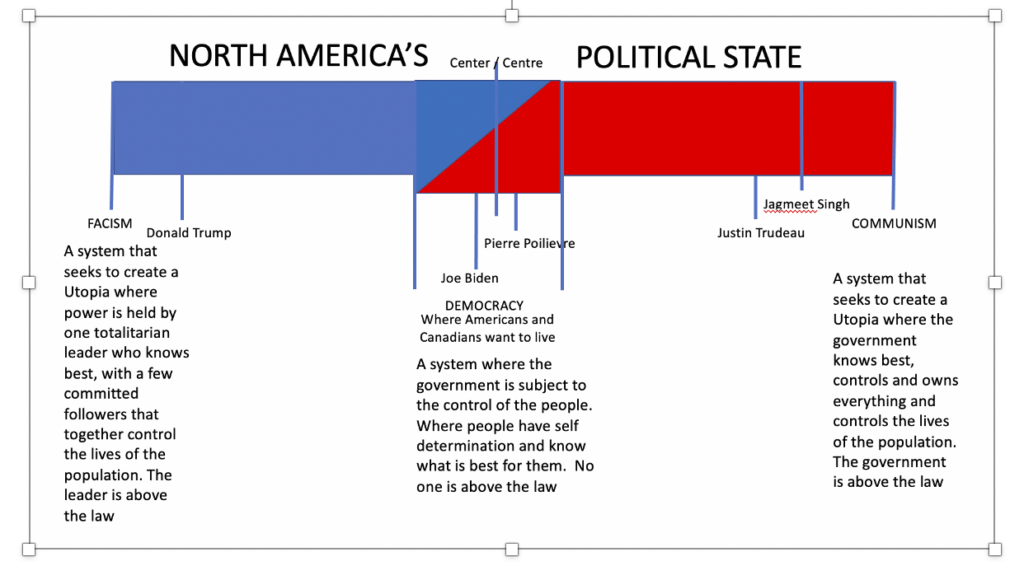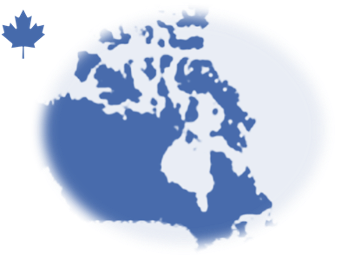Many on the left, particularly in Canada have taken to portraying Pierre Poilievre, Canada’s Conservative party leader to Donald Trump, an American ultra-conservative, want-to-be dictator. This essay is meant to point out the obvious inaccuracy of this portrayal. I will look at the background of the two men, the policies that they propose, and their justification for their positions. We will also look at where they sit on a political scale and their relationship with other nations and with their countrymen.

The diagram above shows the range of political theory from Facism at the far right and Communism at the far left, with current politicians identified as to where they fit into the scale. Note that in most political theory, this scale would be shown as a circle with Democracy at the 12 o’clock point and Facism and Communism joining at the 6 o’clock point. There can be a debate on how far right Donald Trump is or how far left Justine Trudeau is, but I think that there is general agreement that neither is within the rage of democracy. This may explain why the two men dislike each other so much. But getting back to Trump and Poilievre. While Trump is most certainly far right in his politics, the remainder of this study will show that Poilievre is actually either in the centre of possibly slightly left of centre in his politics, especially in an American political context. Lets compare the two men.
BACKGROUND
Trump – Current President Donald Trump is a businessman, media personality, and politician who built his career primarily in real estate before becoming the 45th president of the United States. Born in 1946 in Queens, New York, he was the son of real estate developer Fred Trump, from whom he inherited his wealth and business acumen. After attending the Wharton School at the University of Pennsylvania, Trump joined his father’s company, eventually rebranding it as The Trump Organization. Throughout the 1970s and 1980s, he expanded into luxury real estate, casinos, and hotels, developing iconic properties such as Trump Tower in New York City and various resorts and golf courses worldwide. While some of his ventures were highly successful, others, including several Atlantic City casinos, faced financial struggles and bankruptcy.
In addition to real estate, Trump became a well-known media figure, further cementing his brand through books, licensing deals, and his role as the host of The Apprentice, a reality TV show that aired from 2004 to 2015. His brash, self-promotional style and catchphrase, “You’re fired,” made him a household name. Beyond business, Trump dabbled in politics for years before officially launching a presidential campaign in 2015. Running as a Republican, he used a populist, outsider approach to win the presidency in 2016, defeating Hillary Clinton. His presidency was marked by tax cuts for the rich, deregulation, a conservative shift in the Supreme Court, controversial immigration policies, two impeachments, and a polarizing leadership style that deeply divided the nation.
On a personal level, Trump has been married three times—first to Ivana Trump, with whom he had three children, then to Marla Maples, and later to Melania Trump, with whom he shares a son. His adult children—Donald Jr., Ivanka, and Eric—have played significant roles in both his business and political ventures. Throughout his career, Trump has faced numerous legal and financial controversies, including lawsuits over his business practices, allegations of fraud, and multiple investigations into his post-presidential activities. Despite this, he remains a dominant figure in American politics and business, with a loyal ‘MAGA’ base of supporters and continued influence in conservative circles.
Poilievre – Pierre Poilievre is a Canadian politician and the leader of the Conservative Party of Canada. Born in 1979 in Calgary, Alberta, he was adopted as an infant and raised in a middle-class family in Saskatchewan. He developed an early interest in politics, influenced by conservative values, and attended the University of Calgary, where he studied international relations. Poilievre first entered federal politics in 2004 when he was elected as the Member of Parliament (MP) for the Ottawa-area riding of Nepean—Carleton at just 25 years old. Over the years, he gained a reputation as a sharp and combative political figure, known for his strong advocacy of free markets, small government, and individual freedoms.
During his time in government, Poilievre served in various roles, most notably as Minister of Employment and Social Development under Prime Minister Stephen Harper. In this position, he championed policies such as the Universal Child Care Benefit and tax cuts aimed at families. After the Conservative Party’s defeat in 2015, he remained a key figure in opposition, becoming a leading voice on economic issues, particularly regarding inflation, government spending, and fiscal responsibility. His direct and often confrontational style made him a polarizing but effective communicator, drawing both strong support and criticism.
Poilievre was elected leader of the Conservative Party in 2022, winning a decisive victory with a campaign focused on economic issues, personal freedoms, and reducing government intervention. He has since positioned himself as a staunch critic of Prime Minister Justin Trudeau’s policies, especially on issues like inflation, housing affordability, and energy policy. His leadership has energized the Conservative base, particularly among younger voters and those frustrated with the rising cost of living. As he prepares for the next federal election, Poilievre continues to push for policies that emphasize smaller government, lower taxes, and greater personal freedom, while maintaining a firm stance against what he calls elite political and media establishments.
POLICIES
Immigration
Donald Trump’s immigration policy was one of the defining aspects of his presidency, characterized by strict border enforcement, reduced legal immigration, and a focus on national security. His administration pursued policies aimed at curbing both illegal and legal immigration, including the construction of a border wall along the U.S.-Mexico border, the “Remain in Mexico” policy for asylum seekers, and increased restrictions on refugee admissions.
His administration also implemented the controversial family separation policy at the border and expanded immigration enforcement efforts, leading to a significant increase in deportations. Additionally, Trump sought to limit legal immigration by restricting visa programs, reducing refugee quotas, and imposing travel bans on several Muslim-majority countries, arguing that these measures were necessary for national security.
The rationale behind Trump’s immigration policies was largely rooted in his belief that illegal immigration posed a threat to American jobs, security, and cultural identity. He frequently argued that lax immigration policies led to crime, drug trafficking, and economic hardship for American workers, particularly those in low-wage jobs. His administration framed tighter immigration controls as a way to protect U.S. citizens, promote national sovereignty, and prioritize American workers over foreign labor. Many of these positions resonated strongly with his political base, especially working-class voters who felt economically disadvantaged by global trade and immigration policies.
Trump’s hardline stance on immigration was also driven by his broader “America First” philosophy, which prioritized national interests over global cooperation. His policies were highly polarizing, with critics arguing that they were inhumane, discriminatory, and harmful to the U.S. economy, particularly industries that rely on immigrant labor. Supporters, however, praised his efforts to enforce existing immigration laws and reduce what they saw as excessive, uncontrolled migration. Even after leaving office, Trump has continued to advocate for stricter immigration policies and has made border security a central issue in his ongoing political influence and 2024 presidential campaign.
Immigration – Pierre Poilievre supports a pro-immigration stance but emphasizes reforming the system to ensure efficiency, economic benefits, and national security. He advocates for increasing skilled immigration to address labor shortages, particularly in industries like healthcare, construction, and technology. However, he has been critical of the Trudeau government’s handling of immigration, arguing that high immigration levels, combined with housing shortages and inflation, are worsening affordability issues for Canadians. He has called for a more strategic approach that balances immigration with infrastructure and job market capacity.
One of Poilievre’s key concerns is the backlog and inefficiency in Canada’s immigration system. He has criticized long processing times for work permits, permanent residency applications, and family reunifications, arguing that bureaucracy is preventing immigrants from contributing to the economy. He also supports policies to attract skilled immigrants and ensure that foreign credentials are recognized more efficiently so that newcomers can work in their fields rather than being underemployed. His approach aligns with his broader economic message, which focuses on reducing government inefficiency and fostering economic growth
Poilievre has also taken a strong stance on border security and illegal immigration. He has been critical of the Trudeau government’s handling of irregular border crossings, particularly at Roxham Road in Quebec, where thousands of asylum seekers have entered Canada. He has called for stricter enforcement of immigration laws to ensure that those entering Canada do so through legal and controlled channels. His position reflects his broader conservative values of law and order, economic pragmatism, and government accountability. While he acknowledges the importance of immigration to Canada’s economy and society, he argues that it must be managed in a way that protects Canadian workers, maintains public services, and ensures national security.
ABORTION AND WOMEN’S HEALTHCARE
Donald Trump and the Republican Party generally take a strong anti-abortion stance, advocating for restrictions on abortion access and promoting policies that support the pro-life movement. During his presidency, Trump worked to reshape the judiciary by appointing conservative judges, including three Supreme Court justices—Neil Gorsuch, Brett Kavanaugh, and Amy Coney Barrett—who played a key role in overturning Roe v. Wade in 2022. While Trump initially held mixed views on abortion earlier in his life, he fully embraced the pro-life position as a candidate and president, supporting state-level restrictions, defunding Planned Parenthood, and reinstating the “Mexico City Policy,” which blocked U.S. aid from funding international organizations that provide or promote abortion.
The Republican Party, in general, aligns with pro-life policies, advocating for state control over abortion laws following the Supreme Court’s decision to overturn Roe v. Wade. Many Republican-led states have since enacted strict abortion bans, with some prohibiting the procedure after six weeks of pregnancy or even altogether, often with limited exceptions. The party argues that life begins at conception and that protecting the unborn is a moral and legal responsibility. At the federal level, some Republicans have pushed for national abortion restrictions, while others prefer to leave the issue to individual states.
On broader women’s healthcare, Trump and many Republicans support alternative policies focused on expanding access to birth control, improving maternal healthcare, and increasing funding for crisis pregnancy centers. However, their efforts to repeal the Affordable Care Act (Obamacare) during Trump’s presidency were criticized for potentially reducing access to healthcare for women, particularly in areas like maternity care and contraception. While the party often promotes family-friendly policies such as tax credits for parents and workplace accommodations for mothers, critics argue that their stance on abortion and healthcare access disproportionately affects women, particularly those in low-income and marginalized communities. The abortion debate remains a central and contentious issue in Republican politics, influencing elections, judicial appointments, and state policies.
Pierre Poilievre – and the Conservative Party of Canada take a nuanced approach to abortion, avoiding direct attempts to restrict access while allowing for individual MPs to express pro-life views. Poilievre has stated that he is pro-choice and has promised not to reopen the abortion debate if he becomes prime minister. His stance aligns with the broader Canadian consensus, as abortion is legal at all stages of pregnancy in Canada, and no federal laws restrict it. However, the Conservative Party includes a significant number of socially conservative members who advocate for pro-life policies, and past Conservative governments have seen individual MPs introduce private member’s bills aimed at limiting abortion, though none have passed.
On women’s healthcare more broadly, Poilievre and the Conservatives have focused on issues such as maternal healthcare, fertility treatments, and access to family doctors. Poilievre has criticized Canada’s healthcare system for inefficiencies, long wait times, and doctor shortages, arguing that the federal government should work with provinces to improve access and streamline services. While he supports universal healthcare, he has suggested that the system needs reform, including allowing more private-sector involvement to reduce strain on the public system. His healthcare platform largely centers on reducing bureaucracy and increasing funding efficiency rather than introducing new social programs.
Poilievre has also spoken about the need to address affordability issues that affect women and families, particularly regarding housing, childcare, and the cost of living. While he has not proposed major policy changes specific to women’s healthcare, his economic policies—such as reducing taxes and increasing job opportunities—are framed as ways to improve the overall well-being of all Canadians, including women. His approach reflects the broader Conservative Party stance: maintaining the status quo on abortion rights while focusing on economic and systemic healthcare reforms rather than expanding social services.
CLIMATE CHANGE
Donald Trump and the Republican Party generally take a skeptical approach to climate change policies, prioritizing economic growth, energy independence, and deregulation over environmental concerns. During his presidency, Trump rolled back numerous environmental regulations, withdrew the United States from the Paris Climate Agreement, and promoted the expansion of fossil fuel industries, including coal, oil, and natural gas. His administration reduced restrictions on carbon emissions, weakened fuel efficiency standards, and eased regulations on industries that contribute to pollution. Trump often downplayed the urgency of climate change, framing environmental regulations as burdensome to businesses and arguing that they hurt American workers, particularly in energy-producing states.
The Republican Party, as a whole, tends to support an energy policy focused on domestic production of oil and reduced government intervention. Many Republicans advocate for an “all-of-the-above” energy approach, which includes fossil fuels alongside renewable energy but opposes policies that they believe unfairly target traditional energy industries. They frequently criticize climate policies like carbon taxes, emissions caps, and the Green New Deal, arguing that such measures harm the economy, increase energy prices, and put American industries at a disadvantage. While some Republicans acknowledge the need to address climate change, the party’s dominant stance emphasizes technological innovation, market-driven solutions, and voluntary corporate action rather than government mandates.
Since leaving office, Trump has continued to dismiss climate change concerns, calling environmental policies a tool for government overreach and a threat to economic prosperity. As he campaigns for a potential return to the presidency in 2024, he has vowed to reverse Biden’s climate policies, reinstate fossil fuel-friendly regulations, and withdraw from international climate commitments once again. His influence remains strong within the Republican Party, shaping its overall resistance to aggressive climate action and reinforcing a policy approach that prioritizes economic growth and energy independence over environmental regulation.
Pierre Poilievre – and the Conservative Party of Canada take a more market-driven and industry-friendly approach to climate change, opposing government-heavy regulations and carbon taxes while supporting technological innovation and private-sector solutions. Poilievre has been a vocal critic of Prime Minister Justin Trudeau’s carbon pricing system, arguing that it increases the cost of living for Canadians without effectively reducing emissions. He has pledged to repeal the federal carbon tax and instead focus on policies that encourage businesses to adopt cleaner technologies through incentives rather than government mandates.
The Conservative Party under Poilievre supports an energy strategy that balances environmental concerns with economic growth and energy security. He has emphasized the importance of Canada’s natural resources sector, including oil, natural gas, and mining, arguing that these industries can be part of the solution through cleaner extraction methods and carbon capture technology. Rather than restricting fossil fuel development, Poilievre advocates for increasing exports of Canadian energy, particularly liquefied natural gas (LNG), as a way to reduce global reliance on higher-emission energy sources like coal. He has also criticized government subsidies for electric vehicles and green energy projects, arguing that they distort the market and impose unnecessary costs on taxpayers.
While Poilievre acknowledges the need to reduce emissions, his approach favors technological advancement, private-sector leadership, and free-market solutions rather than federal climate mandates. He has proposed streamlining approval processes for major energy and infrastructure projects to ensure that Canada can develop and export its resources efficiently while maintaining environmental standards. His stance reflects the broader Conservative Party position: skepticism of government-led climate initiatives, opposition to carbon pricing, and a preference for industry-led solutions that align with economic growth and energy independence.
NATIONALISM
Donald Trump’s America First policy is a nationalist/ isolationist approach to foreign and domestic affairs that prioritizes U.S. economic, security, and geopolitical interests over international cooperation. As president, Trump focused on reducing American involvement in global conflicts, renegotiating trade deals, tightening immigration policies, and asserting U.S. sovereignty. He often criticized international agreements that he believed disadvantaged the U.S., such as the Paris Climate Agreement and NATO funding commitments, arguing that other countries should contribute more to global efforts. His economic strategy included tariffs, trade renegotiations, and an emphasis on bringing manufacturing jobs back to America.
- Mexico: Trump has consistently taken a hardline stance on Mexico, primarily regarding immigration and trade. He pushed for the construction of a border wall to curb illegal immigration and drug trafficking and implemented policies like Remain in Mexico to deter asylum seekers. While he renegotiated NAFTA into the USMCA (United States-Mexico-Canada Agreement), improving trade terms for the U.S., he has continued to criticize Mexico over border security and drug cartels.
- Canada: Trump has a tense relationship with Canada in his current presidency, threatening to imposing 25% tariffs on everything exported to the U.S. calling Prime Minister Justin Trudeau the governor of Canada and threatening to drive Canada into economic collapse unless it becomes the 51st state of the United States.
- Greenland: Trump made headlines in 2025 when he expressed interest in purchasing Greenland from Denmark, arguing that it was strategically valuable for military and economic reasons. While Denmark and Greenland have rejected the idea, Trump’s interest highlighted his broader focus on U.S. expansionism. He has not revisited the idea publicly since leaving office.
- Panama: Trump has threatened to take back the Panama Canal through force, emphasized Panama’s role in trade and U.S. security. The Panama Canal remains strategically important for global shipping, and Trump’s position is generally explained as a strategy to counter China’s influence in the region.
Trump has recently proposed moving Gaza’s people to some other location, levelling the territory and building the riviera of the Mediterranean in its place. As president, in his first term, he moved the U.S. Embassy to Jerusalem, recognized Israel’s sovereignty over the Golan Heights, and brokered the Abraham Accords to normalize relations between Israel and several Arab nations. He cut U.S. funding to Palestinian aid organizations and took a hard stance against Hamas and Palestinian leadership, blaming them for ongoing conflict. Since leaving office, he has criticized the Biden administration’s handling of Israel-Palestine tensions and remains firmly aligned with Israel’s security concerns, advocating for strong military and diplomatic support.
In Trump’s return to office, his policies toward these regions have continued along the same lines, emphasizing nationalism, economic leverage, and military strength in global affairs.
Pierre Poilievre’s – foreign policy vision focuses on strengthening Canada’s global standing through economic growth, national security, energy independence, and a more assertive approach to international relations. As leader of the Conservative Party of Canada, he advocates for policies that prioritize Canadian interests while reinforcing alliances with democratic nations. He has criticized Prime Minister Justin Trudeau’s handling of foreign affairs, arguing that Canada has become weaker on the world stage and needs to take a more pragmatic, results-driven approach to diplomacy.
A key component of Poilievre’s global strategy is energy policy. He believes Canada should become a major supplier of oil and natural gas to allies, particularly in Europe and Asia, to reduce reliance on one customer (the U.S.) and to counter authoritarian regimes such as Russia and China. He opposes the federal carbon tax and regulations that he argues hinder energy development, calling for streamlined approvals for pipelines and export infrastructure. But he also is a proponent of the development of nuclear power and other green sources. His stance aligns with his broader economic vision of boosting investment, creating jobs, and leveraging Canada’s resources as a tool for geopolitical influence.
On national security and defense, Poilievre supports increasing military funding and strengthening Canada’s role within NATO, particularly in response to global threats like Russian aggression and Chinese interference. He has been highly critical of China’s influence in Canada, calling for tougher policies on foreign interference, cybersecurity, and economic espionage. Poilievre promotes increased defence in Canada’s north with new military bases, and an increase in the number of polar icebreakers. Regarding Canada’s relationship with the U.S., Poilievre seeks to maintain strong economic ties while ensuring Canada is not overly dependent on American policies. His approach to international affairs emphasizes economic strength, energy security, and a firm stance against authoritarian regimes, positioning Canada as a more self-reliant and influential player on the world stage.
CONCLUSIONS
CANADA AS THE 51ST STATE OF THE U.S.
Trump thinks that he can use his countries economic power to subjugate Canada, Poilievre knows that Canada’s resources, economic potential and the cooperation of its international friends, can make Trump’s plans extremely difficult indeed

While Trump views the world as the dominant vs the weak, with him being the lion in the forest. Poilievre sees the world as an opportunity for Canada to prosper through alliances and mutual opportunity. The lion may just find the polar bear, to be a problematic adversary.




